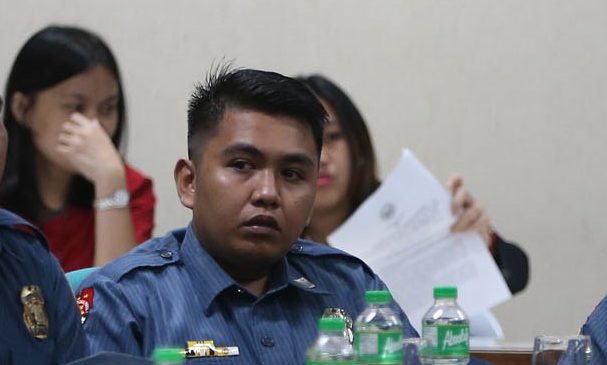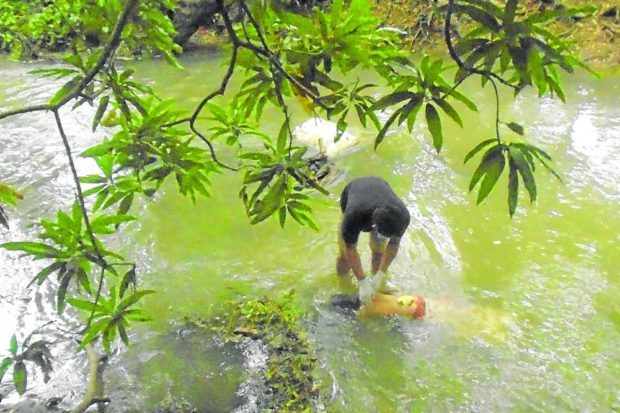Cop guilty of drug war torture, frame-up of teens

Jefrey Perez (INQUIRER FILE PHOTO)
MANILA, Philippines — A Caloocan City court handed down the second criminal conviction of police officers involved in former President Rodrigo Duterte’s bloody drug war after they were found guilty of torturing two teenagers and planting evidence against them five years ago.
Carl Arnaiz, 19, and Reynaldo “Kulot” de Guzman, 14, were found dead days later in places far apart after they were reported missing on Aug. 17, 2017, when the two friends went out for a midnight snack.
Caloocan police officers Jefrey Perez and Ricky Arquilita were charged with murder, torture, and planting of evidence in the deaths of Arnaiz and De Guzman. The two officers were subsequently dismissed from the Philippine National Police.
Arquilita died of liver disease in April 2019 while still on trial, extinguishing his liabilities and leaving Perez to serve the sentence of two life terms imposed by Judge Rodrigo Pascual Jr. of Caloocan City Regional Trial Court Branch 122 in a decision dated Nov. 10 but made public only on Thursday.
The murder case was transferred to Navotas City, where witnesses said they saw the police shoot the victims.
Article continues after this advertisementThe killing and torture of the two teenagers were among the most high-profile cases in the drug war, which included the murder of 17-year-old Kian de los Santos.
Article continues after this advertisementJudge Rodolfo Azucena also of Caloocan sentenced three officers to life imprisonment in 2018 for the murder of Delos Santos, the first conviction of law enforcers involved in the drug war.
Human rights groups welcomed the latest ruling but said the conviction was but a “drop in the bucket” among the thousands of deaths during Duterte’s brutal antidrug campaign.
Human Rights Watch senior researcher Carlos Conde said that while justice was slow, this was an “encouraging development.”
“This boosts the morale and lifts the spirit of the families of the victims of drug war violence. It affirms the hope that, no matter how long it takes, justice can still happen, that accountability is still possible,” he said.
“We are hoping that the courts will act on the many other cases pending before them,” Conde added.
The Philippine Coalition for the International Criminal Court was “not satisfied,” said its cochair Aurora Parong.
“We also hope this is not only an effort to allay the continuing concerns raised by the UN Human Rights Council as well as to evade the continuation of investigation by the (International Criminal Court),” she said.
PNP: ‘A fair trial’
The PNP said it respected the decision, saying it was the “result of a fair trial.”
PNP public information chief Col. Redrico Maranan said that despite the involvement of “erring personnel,” their actions don’t reflect the views of the PNP as a whole.
“The PNP has always maintained its stance to uphold the rule of law in all its undertakings,” Maranan said.
After he assumed the post of PNP chief in August, Gen. Rodolfo Azurin Jr. vowed to uphold the protection of human rights in waging an intensified war on drugs without the numerous killings that characterized the previous administration’s campaign.
Maranan, however, said that the PNP “cannot promise zero casualty” in its antidrug campaign as officers also must protect themselves from attacks.
From July to November, Azurin reported that 46 people were killed by law enforcers—32 by the police and 14 by agents of the Philippine Drug Enforcement Agency.

WRAPPED WITH TAPE | The body of 14-year-old Reynaldo “Kulot” de Guzman, his head wrapped with packing tape, was retrieved from a river in Nueva Ecija province, 19 days after he and his friend Carl Arnaiz, 19, were last seen in Caloocan City on Aug. 17, 2017. Two officers were found guilty of torturing Arnaiz and De Guzman, but one escaped life imprisonment when he died during trial. (Photo from the Philippine National Police)
Wrapped in tape
Arnaiz and De Guzman, who were both from Cainta, Rizal, were last seen alive in closed-circuit television footage in Caloocan’s Barangay 28 on Aug. 17, 2017.
Eleven days later, Arnaiz’s body was found by his parents in a Caloocan morgue. The body had deep abrasions and marks from being handcuffed, dragged, and severely beaten, according to media reports, quoting Dr. Erwin Erfe, chief of the forensic laboratory services of the Public Attorney’s Office.
De Guzman’s body was fished out of a creek in Gapan City, Nueva Ecija province, 19 days after he was last seen alive with Arnaiz. His head was wrapped in packing tape and the killers continued to stab him even after he had already died, according to forensic examinations.
Erfe testified in court that Arnaiz suffered “blunt injuries” that resulted in swelling, contusions, and abrasions in various parts of his face.
De Guzman had 25 stab wounds on different parts of his body, along with abrasions, swellings, and other injuries.
Bodies tell the story
The Caloocan court said there was no witness to the torture of the two as “torture is perpetrated under clandestine conditions, and is done away from the public eye” and the ordeal can only be revealed by the victims themselves.
“Here, Carl and Kulot may have been perpetually silenced by death, but this court cannot close its eyes to the physical evidence left by the torture they suffered,” Judge Pascual wrote in his 36-page decision.
The Caloocan court found that Perez and Arquilita had conspired to report that they had fired at Arnaiz after he allegedly shot them while resisting arrest for car robbery.
A witness told the court that after Arnaiz was killed, he saw Arquilita put on a white glove, held a small black item, approached the body, and took the youngster’s hands. Thereafter he heard gunshots, he said.
Three plastic sachets of “shabu” (crystal meth) were planted inside the backpack of Arnaiz and two sachets of marijuana inside his right pocket, the court said.
“All told, as police officers, Perez and Arquilita are considered agents of a person in authority; they inflicted physical torture to herein victim, for the purpose of punishing them for a crime of robbery they allegedly committed. Hence, for the torture of Arnaiz and De Guzman, the court finds the accused guilty beyond reasonable doubt,” the court ruled.